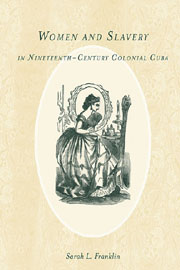Book contents
- Frontmatter
- Contents
- List of Illustrations
- Acknowledgments
- Introduction: Patriarchy, Paternalism, and the Development of the Slave Society
- 1 Virgins and Mothers
- 2 Wives
- 3 Pupils
- 4 The Needy
- 5 Wet Nurses
- Conclusion: A Shifting Landscape
- Abbreviations
- Notes
- Bibliography
- Index
- Rochester Studies in African History and the Diaspora
3 - Pupils
Published online by Cambridge University Press: 05 February 2013
- Frontmatter
- Contents
- List of Illustrations
- Acknowledgments
- Introduction: Patriarchy, Paternalism, and the Development of the Slave Society
- 1 Virgins and Mothers
- 2 Wives
- 3 Pupils
- 4 The Needy
- 5 Wet Nurses
- Conclusion: A Shifting Landscape
- Abbreviations
- Notes
- Bibliography
- Index
- Rochester Studies in African History and the Diaspora
Summary
A woman who debates only Euclid or Newton in the morning writes verse, and by afternoon, translates Sappho or Anacreon.
—Papel Periódico de la Habana, 1802Cuban society prescribed women's roles in nineteenth-century Cuba, and education served to institutionalize that prescription and the hierarchical ordering of society. Cuba's elites used patriarchy both to implement and to maintain the slave society, and education was a necessary component. If, as elites hoped, women were to know their place, they first had to learn their place. Scrutinizing education and how it evolved as the slave society did likewise allows the emergence of a clearer image of the proliferation of patriarchy in the lives of white Cuban women and reveals in high relief how crucial women were to the ordering of Cuban society. Female education was a means to an end, not an end in itself, and nineteenth-century Cubans placed great importance on the expansion of educational opportunity for girls and women as it allowed elites to assert the “civilized” nature of their society even as the institution of slavery rapidly expanded.
Educational Theory
Education was not a static idea or institution in the nineteenth century. During the latter part of the eighteenth century, Spain and her colonies underwent numerous changes, as exemplified by the Bourbon Reforms whereby Spain modified imperial practice in a number of realms including the commercial, administrative, and military, and education was no exception.
- Type
- Chapter
- Information
- Women and Slavery in Nineteenth-Century Colonial Cuba , pp. 71 - 101Publisher: Boydell & BrewerPrint publication year: 2012



